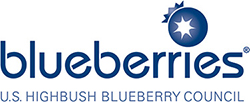Thank you for your continued support of Today's Dietitian. Below is information from one of our sponsors.

| A new study, published in Current Developments in Nutrition, found that consuming the equivalent of one U.S. cup of fresh blueberries (given as 22 g freeze-dried blueberries) resulted in clinically significant improvements in measurable indicators of Type 2 diabetes — Hemoglobin A1c (HbA1c) and fructosamine — compared to a placebo. |
According to the Centers for Disease Control and Prevention, more than 34 million Americans have diabetes (about 1 in 10). Approximately 90-95% of them have type 2 diabetes, which occurs when insulin is made by the pancreas, but the body’s cells gradually lose the ability to absorb and use the insulin. The prevalence of type 2 diabetes is increasing in the U.S. population due to aging, physical inactivity, overweight (body mass index (BMI) > 25 kg/m2) and obesity (BMI > 30 kg/m2) status, all of which are serious risk factors.1 Below is a summary of new research on blueberries’ positive effect on areas of health in overweight men with type 2 diabetes.
The results also showed significantly reduced levels of serum triglycerides after blueberry consumption compared to placebo. Left untreated or uncontrolled, elevated blood triglyceride levels may increase the risk of serious complications such as cardiovascular disease — the leading cause of morbidity and mortality for individuals with diabetes.2
 |
Participants were randomly assigned one of two interventions: 1) 22 g of freeze-dried blueberries (the equivalent of one U.S. cup/day fresh blueberries) along with their regular diet or 2) 22 g of a placebo powder (matched in energy and carbohydrate content to the freeze-dried blueberries) along with their regular diet. Of note, fiber was not controlled in the study, which is known to influence glycemic response.
Compared with the placebo, fasting plasma glucose, serum insulin, total, LDL and HDL cholesterol, CRP concentrations, blood pressure and body weight were not significantly different after eight weeks of freeze-dried blueberry consumption.
While the results of this study cannot be generalized to all populations, they add to the evidence that a dietary intervention with a realistic serving of blueberries may be an effective strategy to improve metabolic factors associated with type 2 diabetes.
|
|||
| New study examines #blueberries effect on markers of diabetes in men overweight men with Type 2 #diabetes. Read more: bit.ly/2H55g52 |
The research was funded by the U.S. Highbush Blueberry Council (USHBC). The USHBC had no role in study design, data collection, data analysis, data interpretation, or writing of the study. For more information on blueberry nutrition research, health information and recipes visit blueberrycouncil.org.
Did you know, blueberries are certified as heart-healthy through the American Heart Association Heart-Check Food Certification Program. The certification program uses transparent, science-based criteria regarding healthy dietary recommendations, food categories, specific product ingredients and nutrient values. They are consistent with relevant government regulatory standards for making coronary heart disease claims. Heart-Check certification does not apply to scientific studies, information, or recipes.
 |
References
1 Centers for Disease Control and Prevention. 2017 Diabetes Report. Available at: https://www.cdc.gov/media/releases/2017/p0718-diabetes-report.html
2 National Heart, Lung, and Blood Institute. High Blood Triglycerides. Available at: https://www.nhlbi.nih.gov/health-topics/high-blood-triglycerides
U.S. Highbush Blueberry Council
81 Blue Ravine Road, Suite 110, Folsom, California 95630